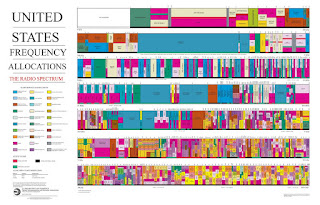In April 2020, the FCC approved the use of 30 MHz of valuable L-Band spectrum for commercial wireless services, including 5G services. This will boost the U.S. economy and our nation's standing in the race for 5G global leadership. Now disgruntled parties who want to delay or undo the L-Band Order are badmouthing it. But their attacks on the agency process that preceded the approval are easily shown to be untrue.
In its L-Band proceeding, the FCC followed the law and engaged its engineering expertise on spectrum interference issues. The Commission's carefully balanced order will promote innovation, investment, and jobs while providing safeguards for GPS services in nearby spectrum bands.
On a 5-0 bipartisan vote, the FCC authorized Ligado Networks to deploy a mixed mobile-satellite network using licensed L-Band spectrum that previously has gone unused. Ligado is pursuing opportunities for private network services. According to the L-Band Order, Ligado plans to invest up to $800 million in network capabilities, which could create over 8,000 jobs. In February 2021, Ligado announced its collaboration with Rakuten Mobile to co-develop 5G private network solutions for critical infrastructure industries such as energy, utilities, healthcare, and agriculture.
As Ligado Networks moves forward with its innovative network plans, its opponents are trying to nitpick the FCC's process leading up to the L-Band Order. For instance, op-eds by Diana Furchtgott-Roth published in April and May of this year rehash attacks on the L-Band proceeding. The most fanciful criticisms of the proceeding were originally made by Sen. James Inhofe in a May 2020 floor speech. Sen. Inhofe claimed that the Commission's process amounted to "a hasty decision" suddenly made "in the darkness of a weekend." Others, including Ms. Furchtgott-Roth, subsequently quoted Sen. Inhofe's wild claims for purposes of attacking the L-Band Order. However, it's a ghost story, not reality.
Furthering the ghost story version of events, Ms. Furchtgott-Roth's op-eds call the L-Band Order "ill-advised" and "inexplicable." Not so. The FCC was ably advised by the agency's Office of Engineering and Technology. The Commission's staff engineers duly considered submissions from federal agencies and all interested parties, conducting a careful analysis of alleged or potential signal interference issues. For instance, the Commission was unpersuaded by certain executive agency claims about possible signal interference with military devices operating outside of their assigned spectrum band.
Executive branch agencies may be unhappy that the FCC didn't agree with their views. But the Commission has the legal responsibility and the expertise to address conflicting views about commercial spectrum usage, and the agency relied on that expertise to make its decision.
In a January 2021 address to the Information Technology Industry Council, then-FCC Chairman Ajit Pai cut to the chase about federal agency disagreements on spectrum use and overheated claims that aren't backed up by hard facts:
[A]rguably the biggest thing hampering efforts to use spectrum more efficiently is – our own government. On proceeding after proceeding, we saw that other federal agencies tried to throw up roadblocks. Rather than look out for the public interest, many agencies were looking out for their narrow parochial interest. And since most don't have in-house spectrum expertise, they ended up simply parroting the exaggerated, hysterical, and often outright false claims being made by the industries they regulate. To achieve their aims, they ended up bypassing normal channels and complaining to Congress or the media in an effort to block or delay efforts to free up spectrum for commercial use.
Among the highly dubious claims called out by Chairman Pai, throw in Ms. Furchtgott-Roth's that "the entire GPS system is endangered" by the L-Band Order.
The deliberative process undertaken by the FCC is a reflected in the L-Band Order's specifics to for safeguarding GPS services. Rather than give Ligado Networks a free pass, the Commission imposed significant conditions on L-Band usage to avoid potential signal interference with incumbents in adjacent spectrum bands. Ligado negotiated agreements with major GPS equipment manufacturers for resolving signal interference concerns. The Commission incorporated those agreements into the L-Band Order, making them enforceable by the agency. Also, the Commission required Ligado to establish a 23 megahertz guard-band, lower base station power levels 99% compared to Ligado's 2015 proposal, and replace any government GPS devices that experience harmful interference. And Ligado must be able to shut off its network within 15 minutes of any request by the Commission.
In January of this year, the newly-constituted FCC rightly rejected an NTIA petition to stay the L-Band Order. Ligado Networks' 5G endeavors ought to be encouraged, not hindered. The careful process undertaken by the Commission should instill confidence in the agency's decision to green light wireless services in the L-Band. And resort by opponents to easily disprovable criticisms of the agency's process also boost confidence in the resulting order.
(For more on this subject, see the May 2020 Perspectives from FSF Scholars paper by Free State Foundation President Randolph J. May and I titled: "FCC's Order Approving Ligado's Next-Gen Wireless Network: A Deliberative Process that Protects Against Signal Interference.")





